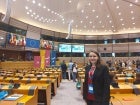Breadcrumb
Stories
Topic
- Show all (1287)
- Gender equality and inequality (-) (38)
- Capacity development (-) (2)
- Literacy (-) (1)
- Ending violence against women and girls (72)
- Gender equality and women’s empowerment (45)
- Anti-violence interventions (42)
- Gender discrimination (38)
- Domestic violence/interpersonal violence (36)
- Access to justice and legal protection (34)
- Legal assistance (30)
- Laws, legislation (27)
- Primary prevention (25)
- Gender-responsive budgeting (24)
- Sexual harassment (24)
- Feminicide/femicide (23)
- Service delivery (23)
- Economic empowerment (22)
- Rape/sexual assault (21)
- Shelters (21)
- Employment (20)
- Rural women (19)
- Entrepreneurship (18)
- Decision-making (16)
- Youth (16)
- Gender power relations (15)
- Women’s rights (15)
- COVID-19 (14)
- Financing for gender equality (13)
- Gender mainstreaming (13)
- Civil society (12)
- Gender, culture and society (12)
- Men and boys (masculinity) (12)
- Political empowerment (12)
- Access to basic services (11)
- Adolescents (11)
- Beijing Platform for Action (11)
- Businesses and foundations (11)
- Girls (11)
- Human rights (11)
- UNiTE campaign (11)
- Civil society participation (10)
- Peace and security (10)
- Safe Cities and Safe Public Spaces (10)
- Training (10)
- Women with disabilities (10)
- Convention on the Elimination of All Forms of Discrimination against Women (CEDAW) (9)
- Financial resources (9)
- Gender stereotypes (9)
- Information and communications technology (ICT) (9)
- Leadership and political participation (9)
- National planning (9)
- Partnerships (9)
- Governance (8)
- Innovation and technology (8)
- Institutional mechanisms (8)
- Peacebuilding (8)
- Social protection (8)
- Women farmers (8)
- Citizen engagement (7)
- Gender statistics (7)
- Generation Equality (7)
- Government contributors (7)
- Productive resources (7)
- Religion (7)
- Science and technology for development (7)
- Sports (7)
- Trafficking/sexual exploitation (7)
- Women’s movements (7)
- 2030 Agenda for Sustainable Development (6)
- Child marriage (6)
- Communications and media (6)
- Electoral systems and processes (6)
- Lesbian, gay, bisexual, transgender, intersex (LGBT) rights (6)
- Markets (6)
- Political violence (6)
- Sex-disaggregated data (6)
- Sustainable Development Goals (SDGs) (6)
- Traditional media (6)
- Unpaid work (6)
- Accountability (5)
- Gender data production and collection (5)
- Governance and national planning (5)
- New media (5)
- Rural development (5)
- Constitutions and legal reform (4)
- Gender data gaps (4)
- Gender data use and accessibility (4)
- Gender wage gap (4)
- Health (4)
- Intergovernmental processes (4)
- Land and property (4)
- Media leadership (4)
- Poverty (4)
- Public administration (4)
- Rule of law (4)
- Schooling (4)
- Accountability in the UN system (3)
- Climate change (3)
- Crisis response and recovery (3)
- Education (3)
- Environmental protection (3)
- Gender equality indicators (3)
- Health care services (3)
- Inheritance rights (3)
- Living conditions (3)
- National mechanisms (3)
- National statistical systems (3)
- Parliamentary development (3)
- UN Security Council resolution 1325 (3)
- UN system coordination (3)
- Coordination, knowledge management (2)
- Disaster risk reduction (2)
- Food security (2)
- Fundamental freedoms (2)
- Fund for Gender Equality (2)
- Harmful practices (2)
- Humanitarian action (2)
- Human rights–based approach (2)
- Macroeconomic policies (2)
- Monitoring and evaluation (2)
- Planning and monitoring (2)
- Sexual and reproductive health and rights (2)
- UN Security Council resolutions (2)
- Urban development (2)
- Åsa Regnér, Deputy Executive Director for Policy, Programme, Civil Society and Intergovernmental Support (1)
- Children’s rights (1)
- Commission on the Status of Women (1)
- Executive Director (1)
- Financial and economic crisis (1)
- Green economy (1)
- Local development (1)
- Maternal health (1)
- Migration (1)
- Monitoring, evaluation and reporting (1)
- Peace processes (1)
- Public sector reform (1)
- Sexuality (1)
- Temporary special measures, affirmative action (1)
- UN Trust Fund to End Violence against Women (1)
Region
Country
1 - 20 of 40 Results
Pagination
Date:
Adivije Hoxha is a dedicated advocate for the rights of persons with disabilities. As the chair of the Association of Para- and Tetraplegics for Durrës, and a former local council candidate, she continues to push for greater representation and equality, inspiring others with her unwavering commitment to change.
Date:
For International Women's Day, UN Women Albania, in partnership with the Albanian Football Federation, UN agencies, and journalists, hosted a mini football tournament as part of the #ForAllWomenAndGirls campaign. Around 40 women and girls participated in an event, turning the football field into a symbol of progress and change.
Date:
As Albania celebrates three decades since the adoption of the Beijing Declaration, the country continues to make strides in gender equality. An inspiring intergenerational dialogue at a recent event brought together key stakeholders from the Ministry of Health and Social Protection, United Nations Albania, the EU Delegation, and other partners, alongside passionate feminist activists from all generations.
Date:
Interview with Flutura Xhabija on attending the Fourth World Conference on Women in Beijing in 1995 and how the Beijing Platform for Action remains relevant today.
Date:
AI is reshaping our world, but biased data can reinforce gender discrimination. From hiring to healthcare, it may amplify inequalities. Expert Zinnya del Villar discusses ethical, inclusive AI solutions with UN Women.
Date:
The media forum provided a dynamic space for knowledge exchange, interactive sessions, and collaboration with gender and human rights experts. Journalists were equipped with new tools to report on sensitive issues with accuracy and inclusivity, challenge harmful stereotypes, and adopt innovative approaches.
Date:
Albania recently hosted its inaugural Gender Datathon, uniting students, researchers, and activists to explore data's role in advancing gender equality. Dive into this groundbreaking event and learn how data literacy can empower advocates for change!
Date:
The revision of Albania’s 2008 Gender Equality Law is underway, as a concrete action following recommendations received by the UN Committee on the rights of women (UN CEDAW).
Date:
The UN Women campaign was launched as part of the United Nations regional initiative “Youth for Inclusion, Equality & Trust” financed by the UN Secretary-General's Peacebuilding Fund. Inspired by John Lennon’s song “Imagine” the campaign reached more than 4.2 million people through social media in Albania, Bosnia and Herzegovina, Kosovo[1], North Macedonia and Serbia.
Date:
David Cuka, a 31-year-old trailblazer from Tirana, Albania, joined the UN Women's "Imagine" campaign aiming to raise awareness and challenge cultural stereotypes and gender-based discrimination in Albania and the Western Balkans.
Date:
“Women and girls in Albania face significant underrepresentation and limited participation in sports due to rooted gender stereotypes, inadequate funding, and biased media portrayal”. These are some of the key findings from the "Gender Equality and Women's Participation in Sports in Albania" assessment, conducted by UN Women.
Date:
Young peacebuilders from the Western Balkans participated in a two-day training to strengthen their capacities on the Women, Peace and Security (WPS) and Youth, Peace and Security (YPS) agendas.
Date:
The week leading to International Women’s Day buzzed with various activities, ranging from a youth-led campaign addressing gender discrimination in the workplace to the launch of Albania's Femicide Watch. An interesting panel featuring only men offered intimate insights into their experiences with patriarchy, feminism, and women’s rights. These events, held in collaboration with governmental bodies, UN agencies, private sectors, and academia, underscored a collective effort to tackle gender inequality from various angles.
Date:
Over the past decades, women and girls around the world have demolished barriers, dismantled stereotypes and driven progress towards more just and equal societies. Women’s rights were recognised as fundamental and universal human rights.
Date:
On the occasion of International Women’s Day, UN Women and students of the Faculty of Social Sciences in Albania launched a campaign to tackle gender stereotypes and discrimination, in partnership with Sophie Caffe, a popular coffee shop chain in the country. The initiative won first prize in a student “bootcamp” organized by UN Women as part of the joint UN programme "Leave No One Behind”.
Date:
Ema Meçaj is a 19-year-old activist from Albania, currently pursuing a degree in medicine at the University of Medicine in Tirana. A dedicated advocate for human rights, gender equality, and climate action, she recently co-moderated the regional youth consultation from December 13 to 14, 2023, in preparation for the 68th session of the Commission on the Status of Women (CSW68). In this Interview, Ema Meçaj reflects on the youth consultations, outlines the key issues for this year’s CSW, and emphasizes the vital role of youth in advancing the gender equality agenda.
Date:
The UN Resident Coordinator’s Office and UN Women Albania co-organized an online training on the Gender Equality Marker (GEM) and the Human Rights Marker (HRM). The overall aim of the training was to ensure that the GEM and HR Marker scoring will be accurate for the upcoming Joint Work Planning cycle, which will cover the 2024-2025 period. The training was also an important step for ensuring the accuracy of markers is instrumental for adequately score UNCT SWAP Indicator 6.1, which verifies whether adequate resources for gender mainstreaming are allocated and tracked.
Date:
Toxic masculinities, rigid gender stereotypes, hate speech and media representation of traditional gender roles increase the risk of violence, particularly against women, which is considered to be the most widespread form of violence throughout the region – according to a new research supported by UN Women.
Date:
Fake news, misinformation, and hate speech are causing significant harm to mental health, exacerbating social divisions, and eroding trust in public institutions throughout the Western Balkans. Marginalized groups, particularly women and girls, are frequently targeted by hate speech. Of particular concern is the role of social media, which has become a fertile breeding ground for disinformation.
Date:
The local government elections on 14 May are an important opportunity to strengthen local democracy in Albania, and to consolidate past achievements in promoting women leadership in decision-making. Ahead of the start of the campaign, the United Nations in Albania reached out to political party leaders, advocating for women’s full and meaningful participation in local elections, and presenting a set of recommendations in three key areas.
1 - 20 of 40 Results


















